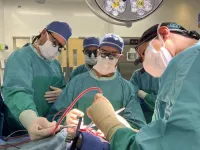(Press-News.org) Prescribing non-steroidal anti-inflammatory drugs (NSAIDs) to people at high risk of harm from them is estimated to cost the NHS in England around £31 million and cause more than 6,000 lost years of good health over 10 years, finds a study published by The BMJ today.
NSAIDs continue to be a source of avoidable harm and healthcare costs, and more needs to be done to address this, especially in high risk groups, say the researchers.
NSAIDs are used for pain and inflammation and are one of the most widely prescribed groups of medicines in the world, But they are known to increase the risk of gastrointestinal bleeding, heart attacks, stroke, and kidney damage.
Yet despite a range of initiatives to reduce their use, NSAID prescribing is still common in people at high risk of harm due to older age, previous peptic ulcer, heart failure, chronic kidney disease, or who are taking other medications that can increase bleeding risk.
To help inform policy in this area, the researchers set out to estimate levels of patient harm and the costs of NSAID prescribing to high risk groups in the NHS in England over a 10 year period.
The researchers drew on previously published research on prescribing safety in England, which provided a baseline number of people affected by ‘hazardous prescribing events’ in April 2020, based on data from the national roll-out of PINCER (pharmacist-led information technology intervention for medication errors) and prevalence data from 1060 general practices (10,906,453 patients in total).
They identified rates of hazardous prescribing events for oral NSAIDs in five high risk groups: adults aged 65 and over with no gastroprotection; people with a previous peptic ulcer with no gastroprotection; people who concurrently took blood thinning drugs (anticoagulants); people with heart failure; and those with chronic kidney disease.
They then used economic models to estimate the harm associated with each hazardous prescribing event at the patient level, expressed as quality adjusted life years (QALYs) lost - a measure of years lived in good health - and the cost to the NHS in England of managing that harm.
The results show that average QALYs per person (where 1.0 is equivalent to perfect health and 0 is equivalent to being dead) were between 0.01 lower with previous peptic ulcer, to 0.11 lower with chronic kidney disease.
Average costs increased from a non-statistically significant £14 in heart failure to a statistically significant £1,097 in people also taking anticoagulants.
Rates of hazardous prescribing events per 1,000 patients ranged from 0.11 in people with a previous peptic ulcer, to 1.70 in older adults.
Nationally, the most common hazardous prescribing event (older adults without gastroprotection) results in 1,929 QALYs lost, costing £2.46 million, while the greatest impact is in people also taking anticoagulants, with 2,143 QALYs lost, costing £25.41 million.
Over 10 years, the five NSAID related hazardous prescribing events led to a total loss of 6,335 QALYs at an estimated cost of £31.43 million to the NHS in England.
Shorter durations of exposure were associated with lower risk of harms, but at least half of the observed harms occurred in the first 1.5 years of treatment.
These are observational findings, and the researchers point to several limitations around assumed dose, length of exposure, and accounting for all harms, which may have affected their estimates. And the results may not apply to other non-UK settings, they note.
However, they say the types, severity, and probability of NSAID-related harm are likely to be transferable, and further analyses to test the strength of the main findings yielded similar results, suggesting that they withstand scrutiny.
As such, they conclude: “NSAIDs continue to be a source of avoidable harm and healthcare costs, despite a range of initiatives to reduce their use, especially in populations at high risk .. therefore, a concerted effort should be made to continue to include NSAIDs in patient safety and deprescribing initiatives.”
[Ends]
END
Harms of prescribing NSAIDs to high risk groups estimated to cost NHS £31m over 10 years
NSAIDs continue to be a source of avoidable harm and healthcare costs, and more needs to be done, say researchers
2024-07-25
ELSE PRESS RELEASES FROM THIS DATE:
Wearing a face mask in public spaces cuts risk of common respiratory symptoms, suggests Norway study
2024-07-25
Wearing a surgical face mask in public spaces reduces the risk of self-reported respiratory symptoms, finds a trial of adults in Norway published by The BMJ today.
The effect was moderate - a 3.2% reduction in symptoms, equivalent to around 3,300 fewer infections per 100,000 people - but the researchers say these results support the claim that face masks may be an effective measure to reduce the rate of self-reported symptoms consistent with respiratory tract infections.
Observational studies suggest that face masks reduce the risk of respiratory tract infections, but findings from randomised ...
Some private biobanks overinflating the value of umbilical cord blood banking in marketing to expectant parents
2024-07-25
Some private UK biobanks may be misleading expectant parents about the value of storing umbilical cord blood to treat life-threatening diseases that may arise in their child in the future, reveals an investigation by The BMJ, published today.
Over the past decade growing numbers of parents have chosen to store blood from the umbilical cord, which contains stem cells, in case their infant develops a condition that could be treated with stem cell therapy.
Parents must use a private biobank which charges around £550 ...
New research in fatty liver disease aims to help with early intervention
2024-07-25
A new study brings researchers closer to better understanding the pathology of the fatty liver disease MASH, which stands for metabolic dysfunction-associated steatohepatitis.
MASH is a consequence of poor diet and obesity and results in severe damage to the liver. In MASH, the liver becomes filled with active and rapidly multiplying T cells, which are a type of immune cell.
In today’s study, published in Hepatology, researchers examine what these T cells look like and how they work in people with liver cirrhosis (a late stage of liver disease) and in an animal ...
Genetics reveal ancient trade routes and path to domestication of the Four Corners potato
2024-07-25
A new study shows that a native potato species was brought to southern Utah by Indigenous people in the distant past, adding to an ever-growing list of culturally significant plant species that pre-contact cultures domesticated in the Southwestern U.S.
The team of researchers, led by Red Butte Garden and the Natural History Museum of Utah (NHMU) at the University of Utah, used genetic analysis to reveal how and where tubers of the Four Corners potato (Solanum jamesii) had been collected, transported and traded throughout the Colorado Plateau. The findings support the assertion that the tuber is a “lost sister,” joining maize, beans and squash—commonly ...
SNIS 2024: New study shows critical improvements in treating rare eye cancer in children
2024-07-25
FOR IMMEDIATE RELEASE: July 24, 2024, 3:20 P.M. MDT
CONTACT: Camille Jewell
cjewell@vancomm.com or 202-248-5460
COLORADO SPRINGS, Colo. — The evolution of retinoblastoma treatment over the past 15 years has resulted in a higher likelihood of vision preservation without compromising survival, according to research released today at the Society of NeuroInterventional Surgery’s (SNIS) 21st Annual Meeting.
Retinoblastoma, a rare eye cancer that affects young children, carries a risk of impaired vision and removal ...
Wearable devices can increase health anxiety. Could they adversely affect health?
2024-07-24
Using a wearable device, such as a smart watch, to track health data and symptoms, is supposed to help people monitor their health and address symptoms as quickly as possible to spur positive health outcomes. But for people with atrial fibrillation, also known as Afib, using a wearable device to monitor the heart rate and to alert wearers of an irregular heartbeat might not be as helpful as wearers think.
A new study in the Journal of the American Heart Association, led by Lindsay Rosman, PhD, assistant professor of medicine in the ...
Addressing wounds of war
2024-07-24
Dr. Olga Denysiuk, MD, PhD, is a highly skilled eye surgeon in Ukraine who now finds herself at the frontlines of ophthalmic trauma care caused by war.
“Every day, I am fighting my war in the operating room,” says Denysiuk. “Cases of eye trauma are mounting and it’s critical that we have surgeons trained to delicately manage eyelid and orbital injuries.”
Denysiuk is one of two ocular specialists selected for a unique humanitarian fellowship at the University of Calgary’s ...
Rice researchers develop innovative battery recycling method
2024-07-24
A research team at Rice University led by James Tour, the T.T. and W.F. Chao Professor of Chemistry and professor of materials science and nanoengineering, is tackling the environmental issue of efficiently recycling lithium ion batteries amid their increasing use.
The team has pioneered a new method to extract purified active materials from battery waste as detailed in the journal Nature Communications on July 24. Their findings have the potential to facilitate the effective separation and recycling of valuable battery materials ...
It’s got praying mantis eyes
2024-07-24
Self-driving cars occasionally crash because their visual systems can’t always process static or slow-moving objects in 3D space. In that regard, they’re like the monocular vision of many insects, whose compound eyes provide great motion-tracking and a wide field of view but poor depth perception.
Except for the praying mantis.
A praying mantis’ field of view also overlaps between its left and right eyes, creating binocular vision with depth perception in 3D space.
Combining this insight with some nifty optoelectrical engineering and innovative “edge” ...
Stroke recovery: It’s in the genes
2024-07-24
New research led by UCLA Health has found that specific genes may be related to the trajectory of recovery for stroke survivors, providing doctors insights useful for developing targeted therapies.
Published in the journal Stroke this month, the findings were part of an exploratory study that sought to find if candidate genes could predict a higher likelihood of stroke outcomes related to depression, post-traumatic stress disorder and cognitive decline.
Dr. Steven C. Cramer, MD, the study’s lead author and a professor of neurology at UCLA, said while there are some ...
LAST 30 PRESS RELEASES:
Transient Pauli blocking for broadband ultrafast optical switching
Political polarization can spur CO2 emissions, stymie climate action
Researchers develop new strategy for improving inverted perovskite solar cells
Yes! The role of YAP and CTGF as potential therapeutic targets for preventing severe liver disease
Pancreatic cancer may begin hiding from the immune system earlier than we thought
Robotic wing inspired by nature delivers leap in underwater stability
A clinical reveals that aniridia causes a progressive loss of corneal sensitivity
Fossil amber reveals the secret lives of Cretaceous ants
Predicting extreme rainfall through novel spatial modeling
The Lancet: First-ever in-utero stem cell therapy for fetal spina bifida repair is safe, study finds
Nanoplastics can interact with Salmonella to affect food safety, study shows
Eric Moore, M.D., elected to Mayo Clinic Board of Trustees
NYU named “research powerhouse” in new analysis
New polymer materials may offer breakthrough solution for hard-to-remove PFAS in water
Biochar can either curb or boost greenhouse gas emissions depending on soil conditions, new study finds
Nanobiochar emerges as a next generation solution for cleaner water, healthier soils, and resilient ecosystems
Study finds more parents saying ‘No’ to vitamin K, putting babies’ brains at risk
Scientists develop new gut health measure that tracks disease
Rice gene discovery could cut fertiliser use while protecting yields
Jumping ‘DNA parasites’ linked to early stages of tumour formation
Ultra-sensitive CAR T cells provide potential strategy to treat solid tumors
Early Neanderthal-Human interbreeding was strongly sex biased
North American bird declines are widespread and accelerating in agricultural hotspots
Researchers recommend strategies for improved genetic privacy legislation
How birds achieve sweet success
More sensitive cell therapy may be a HIT against solid cancers
Scientists map how aging reshapes cells across the entire mammalian body
Hotspots of accelerated bird decline linked to agricultural activity
How ancient attraction shaped the human genome
NJIT faculty named Senior Members of the National Academy of Inventors
[Press-News.org] Harms of prescribing NSAIDs to high risk groups estimated to cost NHS £31m over 10 yearsNSAIDs continue to be a source of avoidable harm and healthcare costs, and more needs to be done, say researchers



